The Role and Importance of Independent Audit Committees: A Report
VerifiedAdded on 2020/04/21
|10
|1648
|119
Report
AI Summary
This report delves into the necessity of independent audit committees for all corporations. It defines audit committees as comprised of non-executive directors who independently assess a company's affairs and facilitate communication between the board of directors and external auditors. The report highlights their crucial role in ensuring accurate and timely financial information for capital providers, thereby promoting transparency and accountability. It explores the advantages, such as improved financial oversight, fraud prevention, and enhanced corporate social responsibility, while also acknowledging potential disadvantages like management resistance and increased costs. The conclusion strongly recommends the implementation of independent audit committees across all organizations to foster better governance and financial integrity.
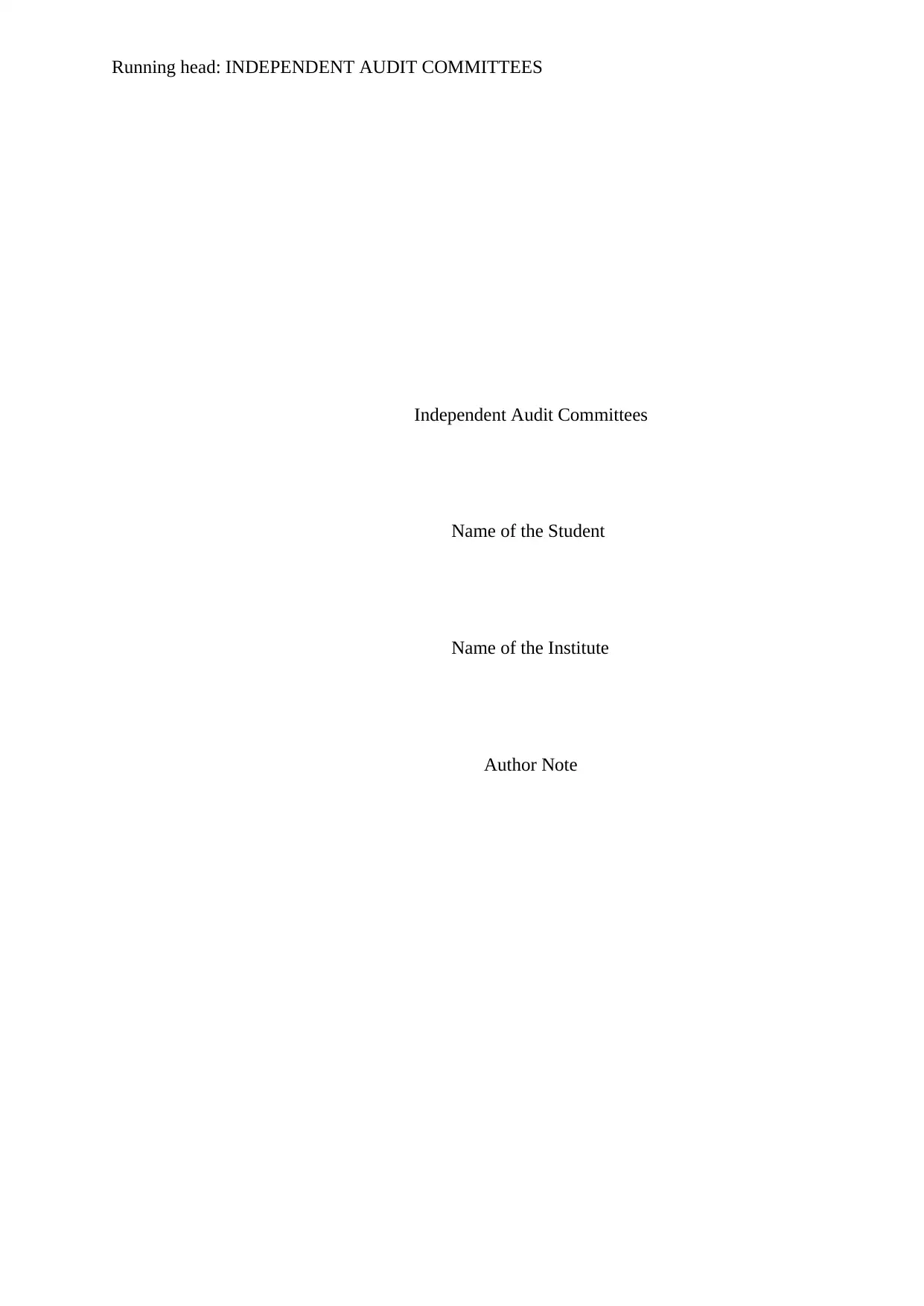
Running head: INDEPENDENT AUDIT COMMITTEES
Independent Audit Committees
Name of the Student
Name of the Institute
Author Note
Independent Audit Committees
Name of the Student
Name of the Institute
Author Note
Paraphrase This Document
Need a fresh take? Get an instant paraphrase of this document with our AI Paraphraser
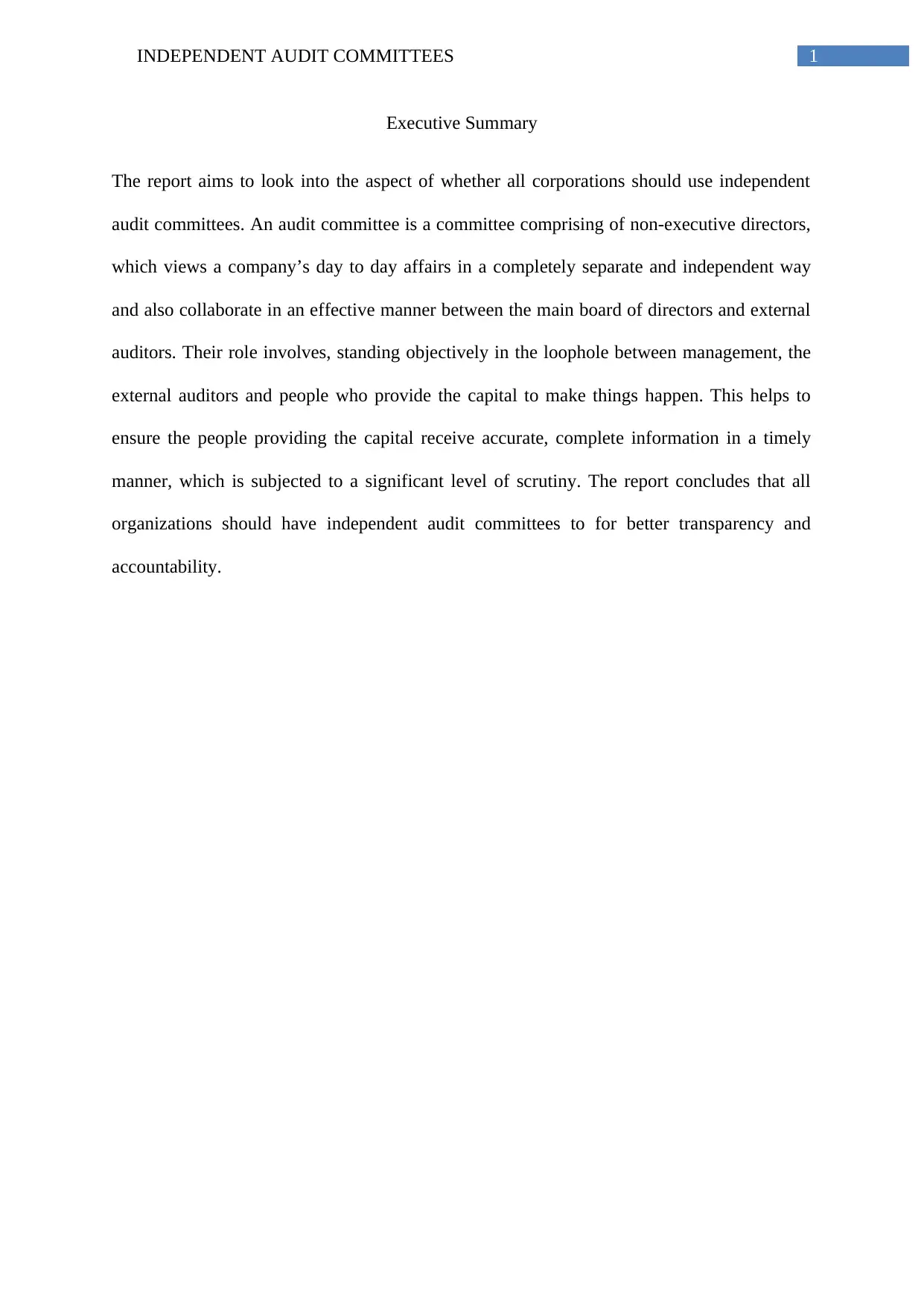
1INDEPENDENT AUDIT COMMITTEES
Executive Summary
The report aims to look into the aspect of whether all corporations should use independent
audit committees. An audit committee is a committee comprising of non-executive directors,
which views a company’s day to day affairs in a completely separate and independent way
and also collaborate in an effective manner between the main board of directors and external
auditors. Their role involves, standing objectively in the loophole between management, the
external auditors and people who provide the capital to make things happen. This helps to
ensure the people providing the capital receive accurate, complete information in a timely
manner, which is subjected to a significant level of scrutiny. The report concludes that all
organizations should have independent audit committees to for better transparency and
accountability.
Executive Summary
The report aims to look into the aspect of whether all corporations should use independent
audit committees. An audit committee is a committee comprising of non-executive directors,
which views a company’s day to day affairs in a completely separate and independent way
and also collaborate in an effective manner between the main board of directors and external
auditors. Their role involves, standing objectively in the loophole between management, the
external auditors and people who provide the capital to make things happen. This helps to
ensure the people providing the capital receive accurate, complete information in a timely
manner, which is subjected to a significant level of scrutiny. The report concludes that all
organizations should have independent audit committees to for better transparency and
accountability.
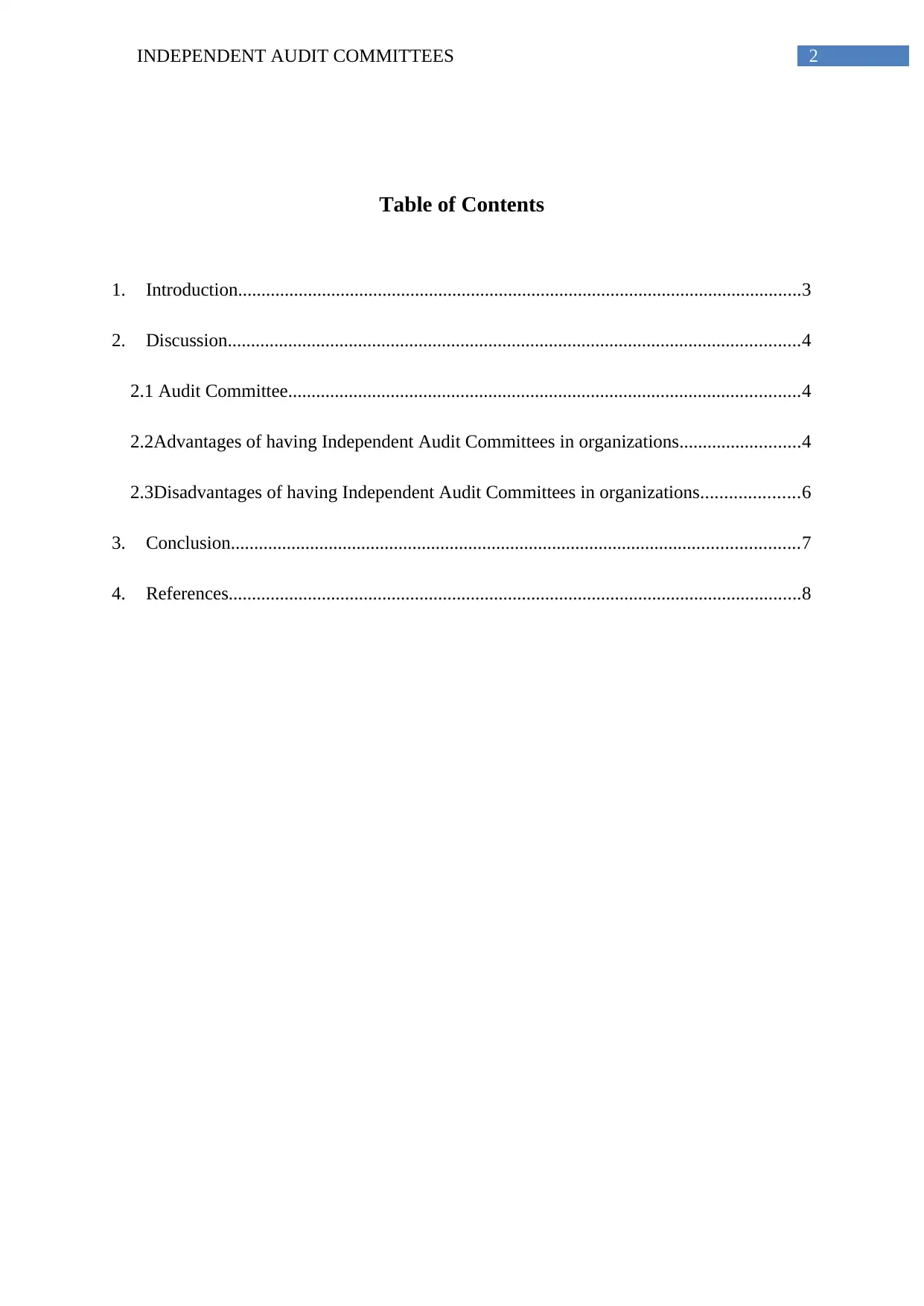
2INDEPENDENT AUDIT COMMITTEES
Table of Contents
1. Introduction.........................................................................................................................3
2. Discussion...........................................................................................................................4
2.1 Audit Committee..............................................................................................................4
2.2Advantages of having Independent Audit Committees in organizations..........................4
2.3Disadvantages of having Independent Audit Committees in organizations.....................6
3. Conclusion..........................................................................................................................7
4. References...........................................................................................................................8
Table of Contents
1. Introduction.........................................................................................................................3
2. Discussion...........................................................................................................................4
2.1 Audit Committee..............................................................................................................4
2.2Advantages of having Independent Audit Committees in organizations..........................4
2.3Disadvantages of having Independent Audit Committees in organizations.....................6
3. Conclusion..........................................................................................................................7
4. References...........................................................................................................................8
⊘ This is a preview!⊘
Do you want full access?
Subscribe today to unlock all pages.

Trusted by 1+ million students worldwide
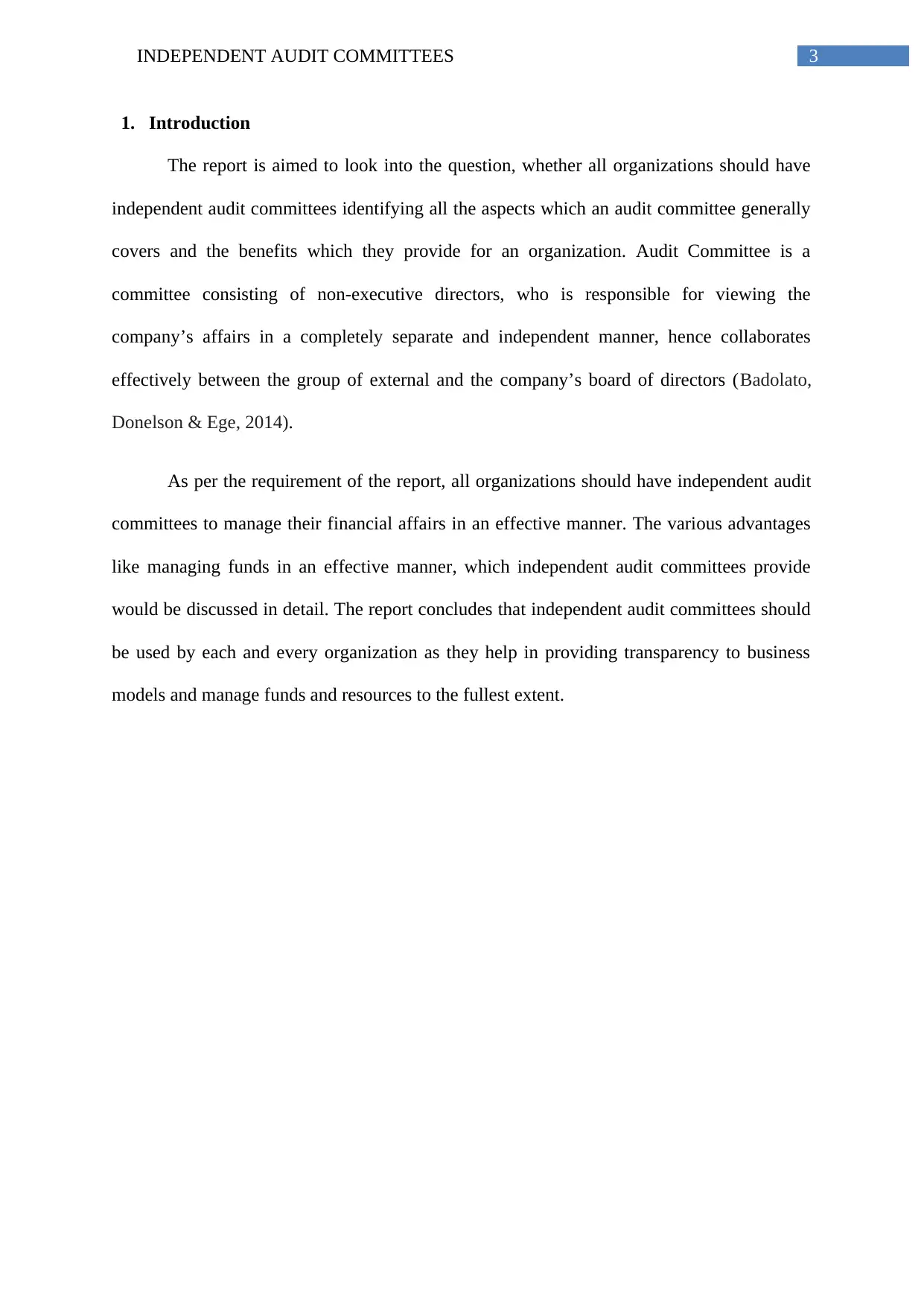
3INDEPENDENT AUDIT COMMITTEES
1. Introduction
The report is aimed to look into the question, whether all organizations should have
independent audit committees identifying all the aspects which an audit committee generally
covers and the benefits which they provide for an organization. Audit Committee is a
committee consisting of non-executive directors, who is responsible for viewing the
company’s affairs in a completely separate and independent manner, hence collaborates
effectively between the group of external and the company’s board of directors (Badolato,
Donelson & Ege, 2014).
As per the requirement of the report, all organizations should have independent audit
committees to manage their financial affairs in an effective manner. The various advantages
like managing funds in an effective manner, which independent audit committees provide
would be discussed in detail. The report concludes that independent audit committees should
be used by each and every organization as they help in providing transparency to business
models and manage funds and resources to the fullest extent.
1. Introduction
The report is aimed to look into the question, whether all organizations should have
independent audit committees identifying all the aspects which an audit committee generally
covers and the benefits which they provide for an organization. Audit Committee is a
committee consisting of non-executive directors, who is responsible for viewing the
company’s affairs in a completely separate and independent manner, hence collaborates
effectively between the group of external and the company’s board of directors (Badolato,
Donelson & Ege, 2014).
As per the requirement of the report, all organizations should have independent audit
committees to manage their financial affairs in an effective manner. The various advantages
like managing funds in an effective manner, which independent audit committees provide
would be discussed in detail. The report concludes that independent audit committees should
be used by each and every organization as they help in providing transparency to business
models and manage funds and resources to the fullest extent.
Paraphrase This Document
Need a fresh take? Get an instant paraphrase of this document with our AI Paraphraser
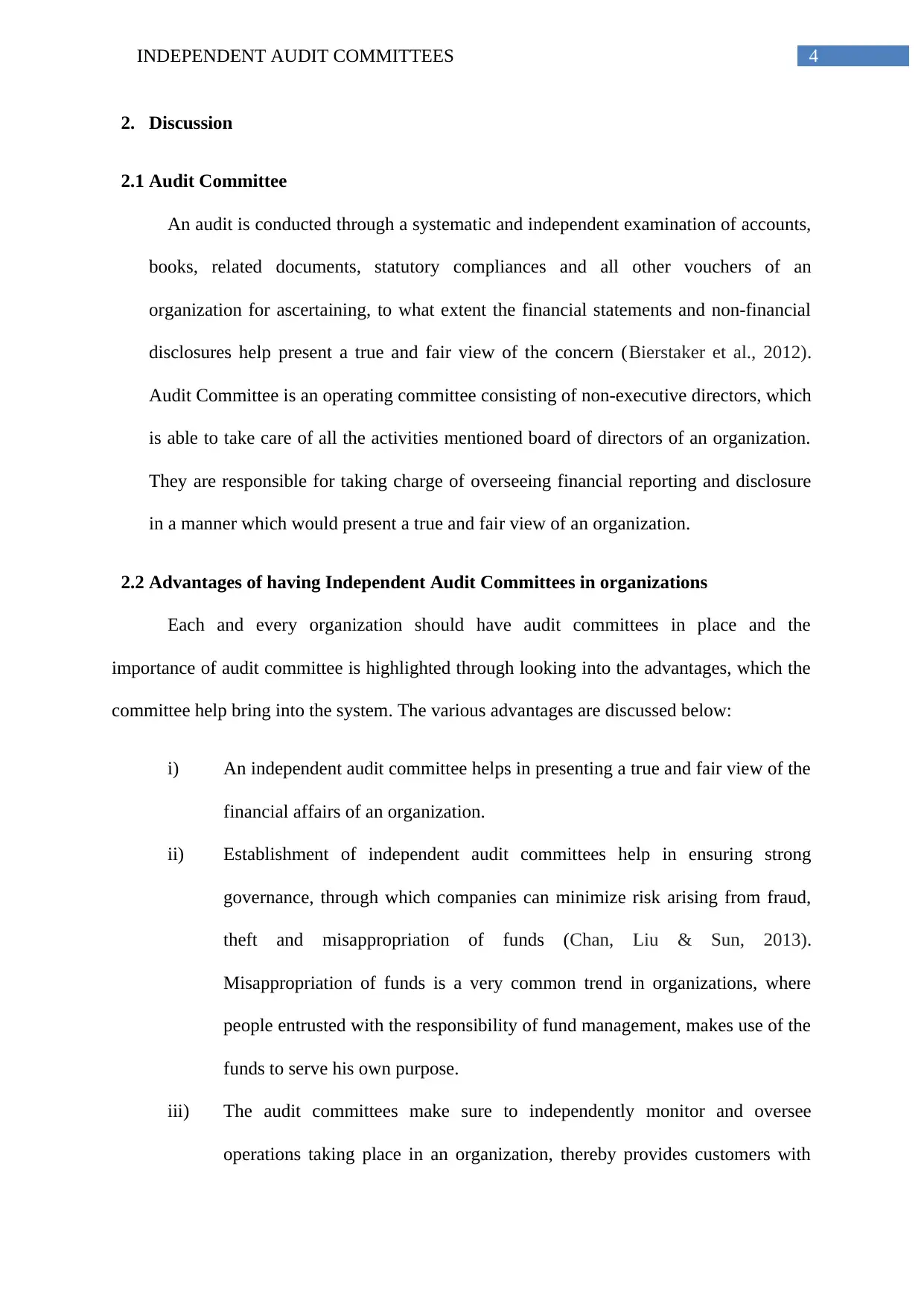
4INDEPENDENT AUDIT COMMITTEES
2. Discussion
2.1 Audit Committee
An audit is conducted through a systematic and independent examination of accounts,
books, related documents, statutory compliances and all other vouchers of an
organization for ascertaining, to what extent the financial statements and non-financial
disclosures help present a true and fair view of the concern (Bierstaker et al., 2012).
Audit Committee is an operating committee consisting of non-executive directors, which
is able to take care of all the activities mentioned board of directors of an organization.
They are responsible for taking charge of overseeing financial reporting and disclosure
in a manner which would present a true and fair view of an organization.
2.2 Advantages of having Independent Audit Committees in organizations
Each and every organization should have audit committees in place and the
importance of audit committee is highlighted through looking into the advantages, which the
committee help bring into the system. The various advantages are discussed below:
i) An independent audit committee helps in presenting a true and fair view of the
financial affairs of an organization.
ii) Establishment of independent audit committees help in ensuring strong
governance, through which companies can minimize risk arising from fraud,
theft and misappropriation of funds (Chan, Liu & Sun, 2013).
Misappropriation of funds is a very common trend in organizations, where
people entrusted with the responsibility of fund management, makes use of the
funds to serve his own purpose.
iii) The audit committees make sure to independently monitor and oversee
operations taking place in an organization, thereby provides customers with
2. Discussion
2.1 Audit Committee
An audit is conducted through a systematic and independent examination of accounts,
books, related documents, statutory compliances and all other vouchers of an
organization for ascertaining, to what extent the financial statements and non-financial
disclosures help present a true and fair view of the concern (Bierstaker et al., 2012).
Audit Committee is an operating committee consisting of non-executive directors, which
is able to take care of all the activities mentioned board of directors of an organization.
They are responsible for taking charge of overseeing financial reporting and disclosure
in a manner which would present a true and fair view of an organization.
2.2 Advantages of having Independent Audit Committees in organizations
Each and every organization should have audit committees in place and the
importance of audit committee is highlighted through looking into the advantages, which the
committee help bring into the system. The various advantages are discussed below:
i) An independent audit committee helps in presenting a true and fair view of the
financial affairs of an organization.
ii) Establishment of independent audit committees help in ensuring strong
governance, through which companies can minimize risk arising from fraud,
theft and misappropriation of funds (Chan, Liu & Sun, 2013).
Misappropriation of funds is a very common trend in organizations, where
people entrusted with the responsibility of fund management, makes use of the
funds to serve his own purpose.
iii) The audit committees make sure to independently monitor and oversee
operations taking place in an organization, thereby provides customers with
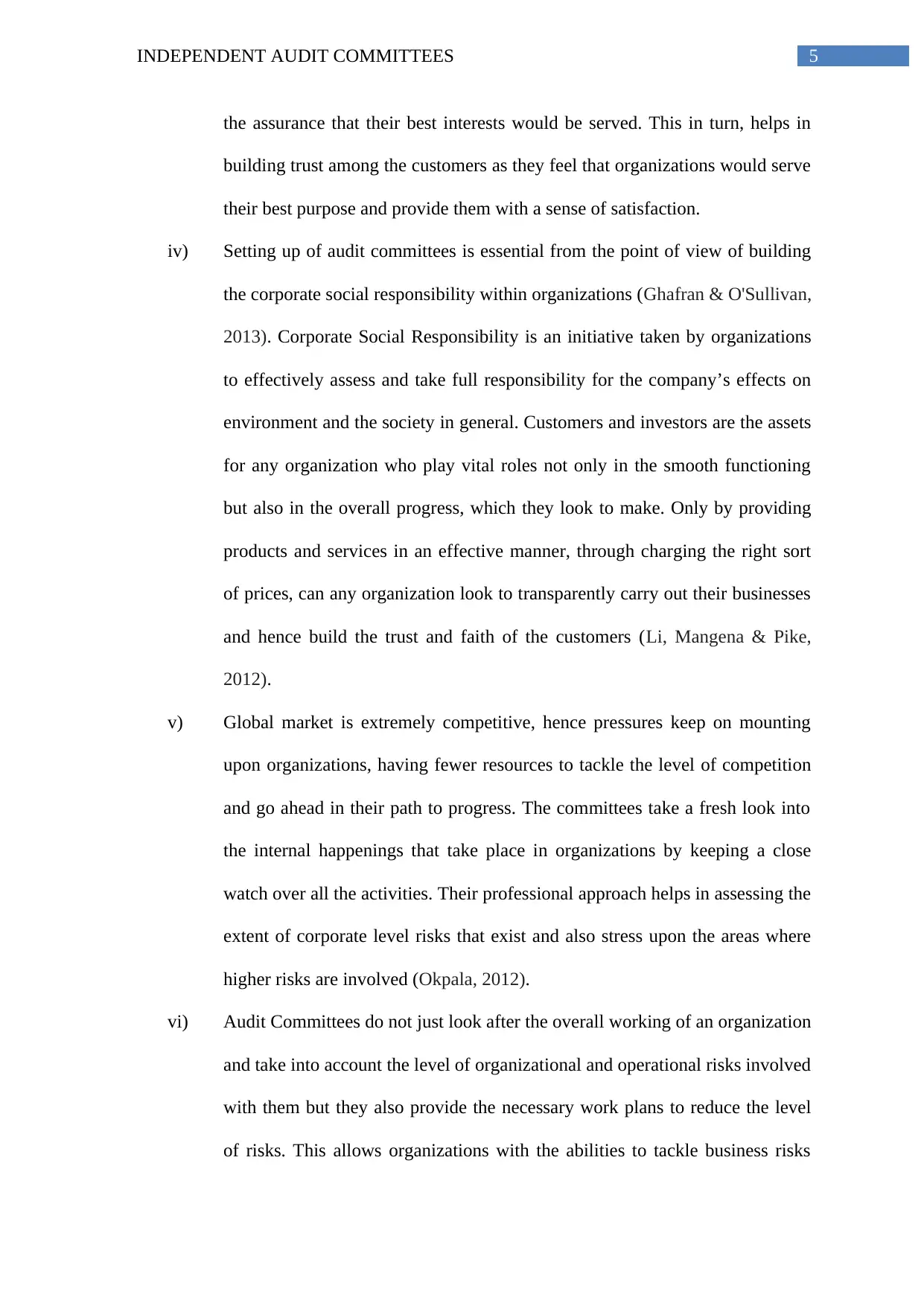
5INDEPENDENT AUDIT COMMITTEES
the assurance that their best interests would be served. This in turn, helps in
building trust among the customers as they feel that organizations would serve
their best purpose and provide them with a sense of satisfaction.
iv) Setting up of audit committees is essential from the point of view of building
the corporate social responsibility within organizations (Ghafran & O'Sullivan,
2013). Corporate Social Responsibility is an initiative taken by organizations
to effectively assess and take full responsibility for the company’s effects on
environment and the society in general. Customers and investors are the assets
for any organization who play vital roles not only in the smooth functioning
but also in the overall progress, which they look to make. Only by providing
products and services in an effective manner, through charging the right sort
of prices, can any organization look to transparently carry out their businesses
and hence build the trust and faith of the customers (Li, Mangena & Pike,
2012).
v) Global market is extremely competitive, hence pressures keep on mounting
upon organizations, having fewer resources to tackle the level of competition
and go ahead in their path to progress. The committees take a fresh look into
the internal happenings that take place in organizations by keeping a close
watch over all the activities. Their professional approach helps in assessing the
extent of corporate level risks that exist and also stress upon the areas where
higher risks are involved (Okpala, 2012).
vi) Audit Committees do not just look after the overall working of an organization
and take into account the level of organizational and operational risks involved
with them but they also provide the necessary work plans to reduce the level
of risks. This allows organizations with the abilities to tackle business risks
the assurance that their best interests would be served. This in turn, helps in
building trust among the customers as they feel that organizations would serve
their best purpose and provide them with a sense of satisfaction.
iv) Setting up of audit committees is essential from the point of view of building
the corporate social responsibility within organizations (Ghafran & O'Sullivan,
2013). Corporate Social Responsibility is an initiative taken by organizations
to effectively assess and take full responsibility for the company’s effects on
environment and the society in general. Customers and investors are the assets
for any organization who play vital roles not only in the smooth functioning
but also in the overall progress, which they look to make. Only by providing
products and services in an effective manner, through charging the right sort
of prices, can any organization look to transparently carry out their businesses
and hence build the trust and faith of the customers (Li, Mangena & Pike,
2012).
v) Global market is extremely competitive, hence pressures keep on mounting
upon organizations, having fewer resources to tackle the level of competition
and go ahead in their path to progress. The committees take a fresh look into
the internal happenings that take place in organizations by keeping a close
watch over all the activities. Their professional approach helps in assessing the
extent of corporate level risks that exist and also stress upon the areas where
higher risks are involved (Okpala, 2012).
vi) Audit Committees do not just look after the overall working of an organization
and take into account the level of organizational and operational risks involved
with them but they also provide the necessary work plans to reduce the level
of risks. This allows organizations with the abilities to tackle business risks
⊘ This is a preview!⊘
Do you want full access?
Subscribe today to unlock all pages.

Trusted by 1+ million students worldwide
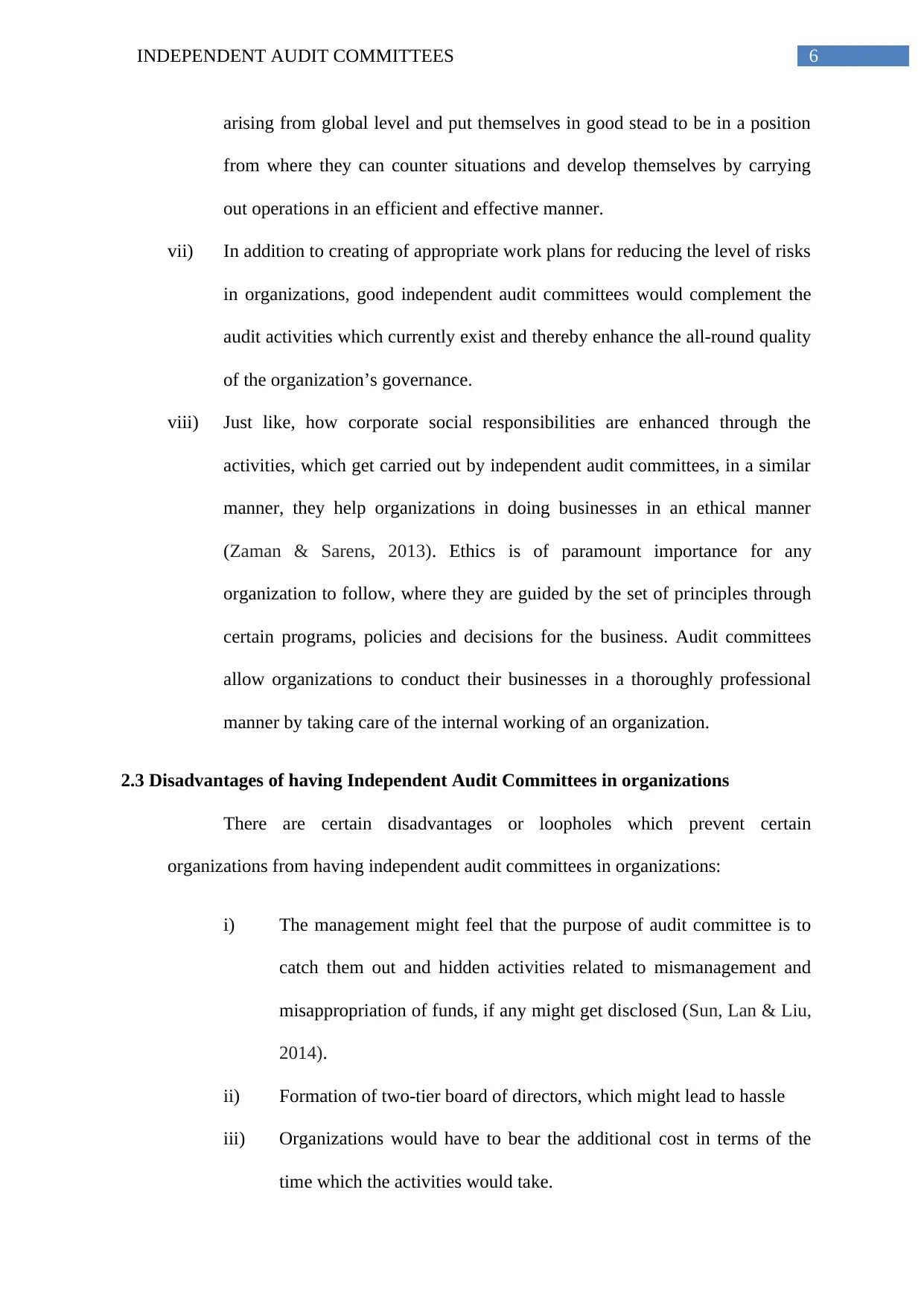
6INDEPENDENT AUDIT COMMITTEES
arising from global level and put themselves in good stead to be in a position
from where they can counter situations and develop themselves by carrying
out operations in an efficient and effective manner.
vii) In addition to creating of appropriate work plans for reducing the level of risks
in organizations, good independent audit committees would complement the
audit activities which currently exist and thereby enhance the all-round quality
of the organization’s governance.
viii) Just like, how corporate social responsibilities are enhanced through the
activities, which get carried out by independent audit committees, in a similar
manner, they help organizations in doing businesses in an ethical manner
(Zaman & Sarens, 2013). Ethics is of paramount importance for any
organization to follow, where they are guided by the set of principles through
certain programs, policies and decisions for the business. Audit committees
allow organizations to conduct their businesses in a thoroughly professional
manner by taking care of the internal working of an organization.
2.3 Disadvantages of having Independent Audit Committees in organizations
There are certain disadvantages or loopholes which prevent certain
organizations from having independent audit committees in organizations:
i) The management might feel that the purpose of audit committee is to
catch them out and hidden activities related to mismanagement and
misappropriation of funds, if any might get disclosed (Sun, Lan & Liu,
2014).
ii) Formation of two-tier board of directors, which might lead to hassle
iii) Organizations would have to bear the additional cost in terms of the
time which the activities would take.
arising from global level and put themselves in good stead to be in a position
from where they can counter situations and develop themselves by carrying
out operations in an efficient and effective manner.
vii) In addition to creating of appropriate work plans for reducing the level of risks
in organizations, good independent audit committees would complement the
audit activities which currently exist and thereby enhance the all-round quality
of the organization’s governance.
viii) Just like, how corporate social responsibilities are enhanced through the
activities, which get carried out by independent audit committees, in a similar
manner, they help organizations in doing businesses in an ethical manner
(Zaman & Sarens, 2013). Ethics is of paramount importance for any
organization to follow, where they are guided by the set of principles through
certain programs, policies and decisions for the business. Audit committees
allow organizations to conduct their businesses in a thoroughly professional
manner by taking care of the internal working of an organization.
2.3 Disadvantages of having Independent Audit Committees in organizations
There are certain disadvantages or loopholes which prevent certain
organizations from having independent audit committees in organizations:
i) The management might feel that the purpose of audit committee is to
catch them out and hidden activities related to mismanagement and
misappropriation of funds, if any might get disclosed (Sun, Lan & Liu,
2014).
ii) Formation of two-tier board of directors, which might lead to hassle
iii) Organizations would have to bear the additional cost in terms of the
time which the activities would take.
Paraphrase This Document
Need a fresh take? Get an instant paraphrase of this document with our AI Paraphraser
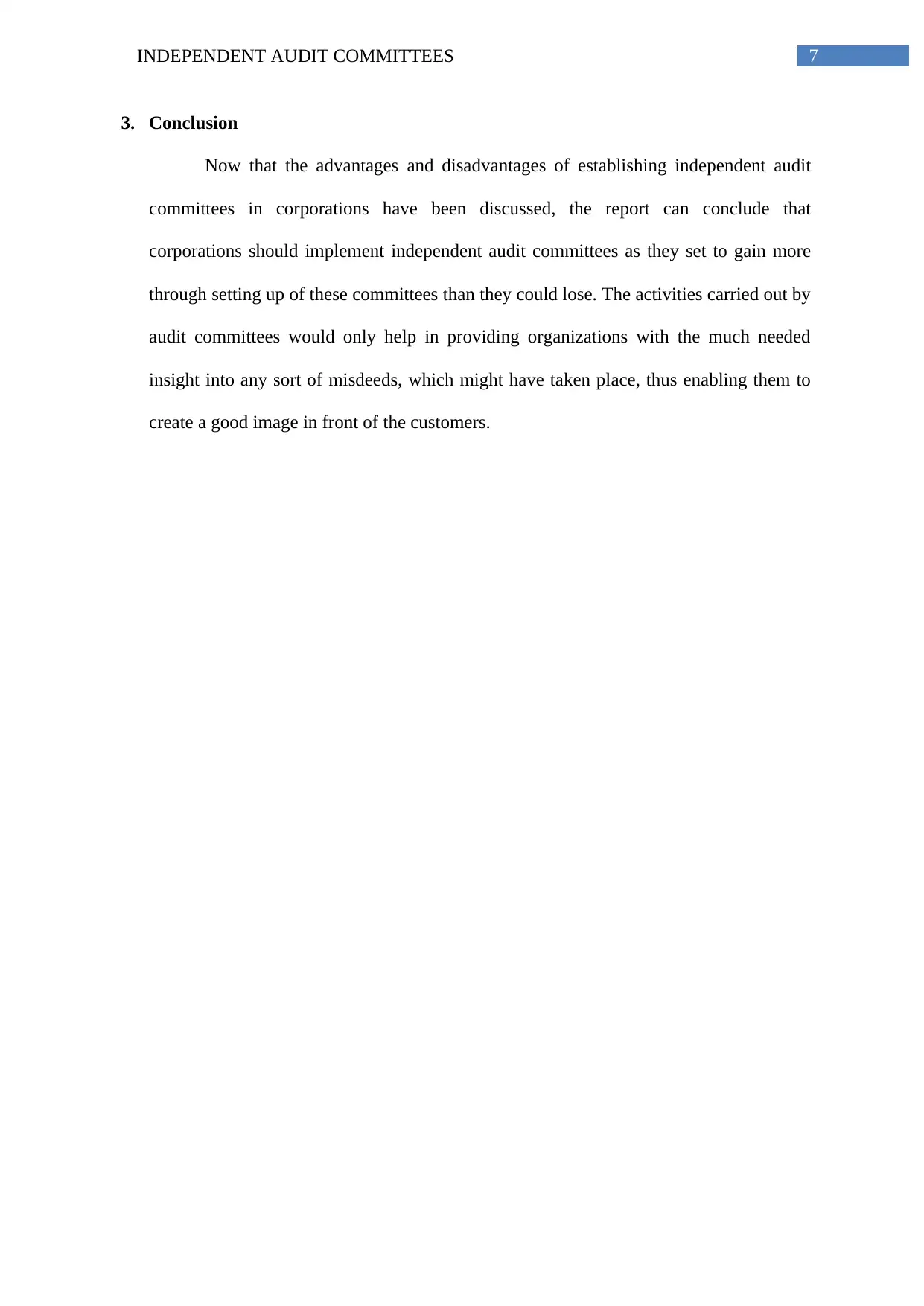
7INDEPENDENT AUDIT COMMITTEES
3. Conclusion
Now that the advantages and disadvantages of establishing independent audit
committees in corporations have been discussed, the report can conclude that
corporations should implement independent audit committees as they set to gain more
through setting up of these committees than they could lose. The activities carried out by
audit committees would only help in providing organizations with the much needed
insight into any sort of misdeeds, which might have taken place, thus enabling them to
create a good image in front of the customers.
3. Conclusion
Now that the advantages and disadvantages of establishing independent audit
committees in corporations have been discussed, the report can conclude that
corporations should implement independent audit committees as they set to gain more
through setting up of these committees than they could lose. The activities carried out by
audit committees would only help in providing organizations with the much needed
insight into any sort of misdeeds, which might have taken place, thus enabling them to
create a good image in front of the customers.
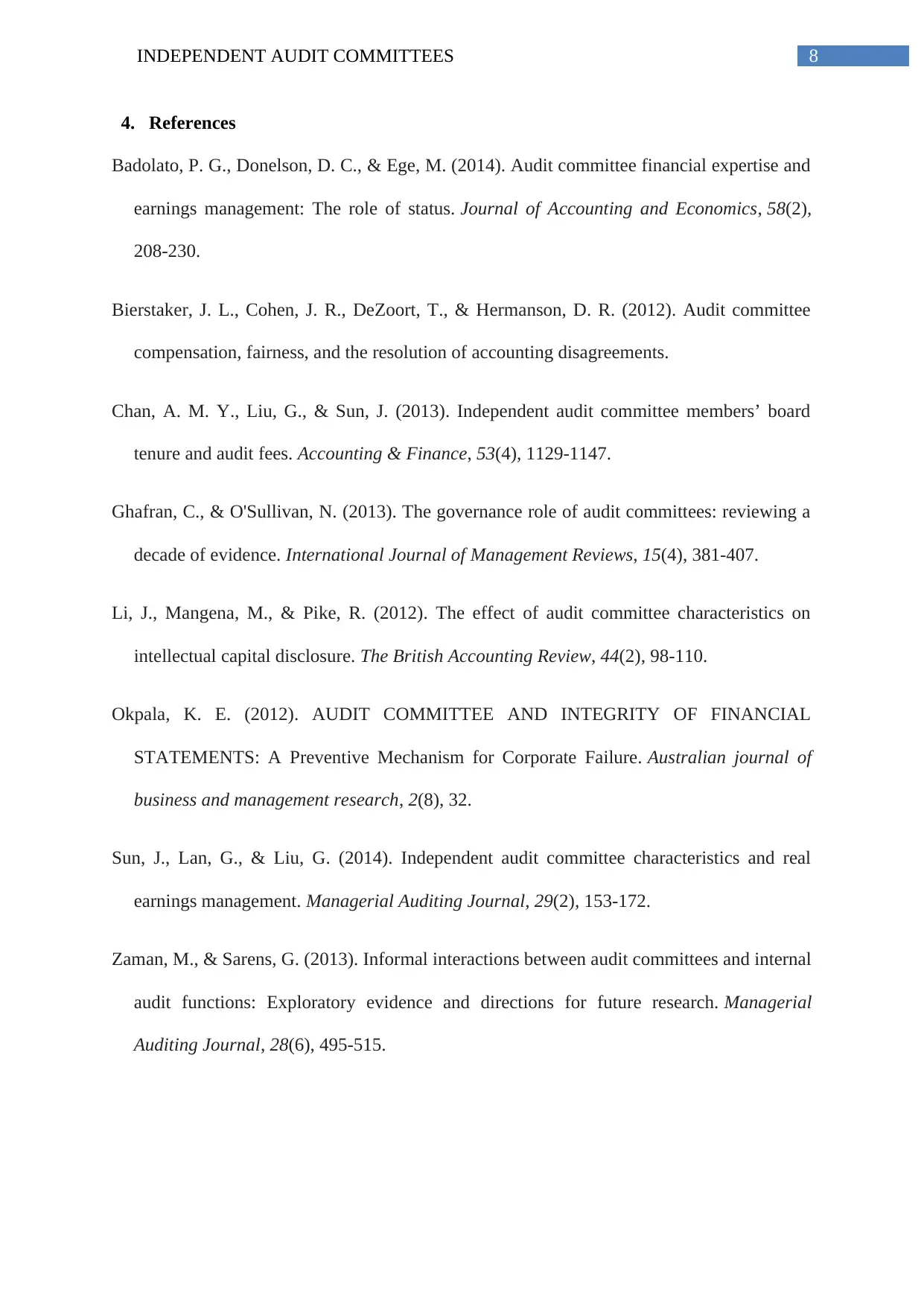
8INDEPENDENT AUDIT COMMITTEES
4. References
Badolato, P. G., Donelson, D. C., & Ege, M. (2014). Audit committee financial expertise and
earnings management: The role of status. Journal of Accounting and Economics, 58(2),
208-230.
Bierstaker, J. L., Cohen, J. R., DeZoort, T., & Hermanson, D. R. (2012). Audit committee
compensation, fairness, and the resolution of accounting disagreements.
Chan, A. M. Y., Liu, G., & Sun, J. (2013). Independent audit committee members’ board
tenure and audit fees. Accounting & Finance, 53(4), 1129-1147.
Ghafran, C., & O'Sullivan, N. (2013). The governance role of audit committees: reviewing a
decade of evidence. International Journal of Management Reviews, 15(4), 381-407.
Li, J., Mangena, M., & Pike, R. (2012). The effect of audit committee characteristics on
intellectual capital disclosure. The British Accounting Review, 44(2), 98-110.
Okpala, K. E. (2012). AUDIT COMMITTEE AND INTEGRITY OF FINANCIAL
STATEMENTS: A Preventive Mechanism for Corporate Failure. Australian journal of
business and management research, 2(8), 32.
Sun, J., Lan, G., & Liu, G. (2014). Independent audit committee characteristics and real
earnings management. Managerial Auditing Journal, 29(2), 153-172.
Zaman, M., & Sarens, G. (2013). Informal interactions between audit committees and internal
audit functions: Exploratory evidence and directions for future research. Managerial
Auditing Journal, 28(6), 495-515.
4. References
Badolato, P. G., Donelson, D. C., & Ege, M. (2014). Audit committee financial expertise and
earnings management: The role of status. Journal of Accounting and Economics, 58(2),
208-230.
Bierstaker, J. L., Cohen, J. R., DeZoort, T., & Hermanson, D. R. (2012). Audit committee
compensation, fairness, and the resolution of accounting disagreements.
Chan, A. M. Y., Liu, G., & Sun, J. (2013). Independent audit committee members’ board
tenure and audit fees. Accounting & Finance, 53(4), 1129-1147.
Ghafran, C., & O'Sullivan, N. (2013). The governance role of audit committees: reviewing a
decade of evidence. International Journal of Management Reviews, 15(4), 381-407.
Li, J., Mangena, M., & Pike, R. (2012). The effect of audit committee characteristics on
intellectual capital disclosure. The British Accounting Review, 44(2), 98-110.
Okpala, K. E. (2012). AUDIT COMMITTEE AND INTEGRITY OF FINANCIAL
STATEMENTS: A Preventive Mechanism for Corporate Failure. Australian journal of
business and management research, 2(8), 32.
Sun, J., Lan, G., & Liu, G. (2014). Independent audit committee characteristics and real
earnings management. Managerial Auditing Journal, 29(2), 153-172.
Zaman, M., & Sarens, G. (2013). Informal interactions between audit committees and internal
audit functions: Exploratory evidence and directions for future research. Managerial
Auditing Journal, 28(6), 495-515.
⊘ This is a preview!⊘
Do you want full access?
Subscribe today to unlock all pages.

Trusted by 1+ million students worldwide

9INDEPENDENT AUDIT COMMITTEES
1 out of 10
Related Documents
Your All-in-One AI-Powered Toolkit for Academic Success.
+13062052269
info@desklib.com
Available 24*7 on WhatsApp / Email
![[object Object]](/_next/static/media/star-bottom.7253800d.svg)
Unlock your academic potential
Copyright © 2020–2025 A2Z Services. All Rights Reserved. Developed and managed by ZUCOL.




